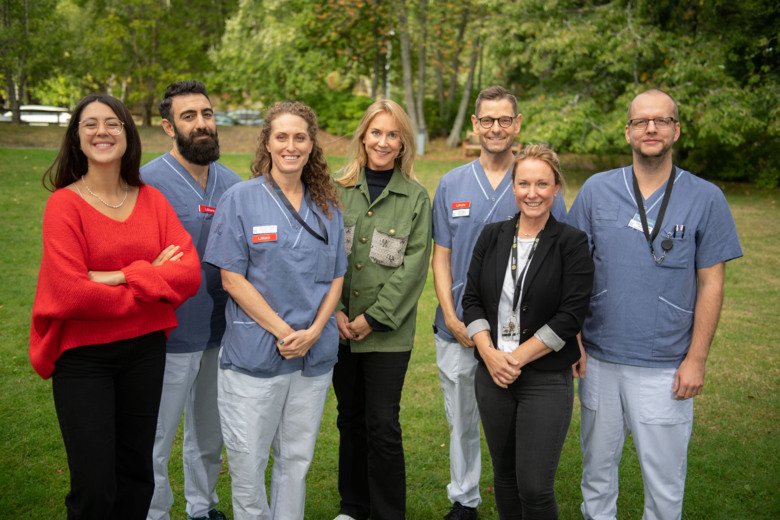 Foto: Getty Images
Foto: Getty ImagesALS Clinical Research Group
Länk till ALS Clinical Research Group's egen webbsida

ALS (amyotrofisk lateral skleros) är en dödlig neuromuskulär sjukdom som kännetecknas av degeneration av de övre och nedre motorneuronen. Patienterna upplever en svaghet som vanligtvis börjar i övre eller nedre extremiteterna och som sedan sprider sig till andra regioner som försvagar både tal svalg. Förutom muskelsvagheten ses en tilltagande kognitiv dysfunktion och beteendeförändringar hos ungefär hälften av patienterna och en del av dem utvecklar fulminant frontotemporal demens.
 Foto: Getty Images
Foto: Getty ImagesLänk till ALS Clinical Research Group's egen webbsida

I år markerar 10-årsjubileet för ALSrisc-projektet, och vi vill ta detta tillfälle i akt att tacka personer som lever med ALS och deras familjer för deras ovärderliga insats.

Caroline Ingre anställs som adjungerad professor i neurologi vid institutionen för klinisk neurovetenskap från och med den 1 oktober 2025. Stort grattis till Caroline!

Den 14 februari 2025 försvarade Juliette Foucher sin doktorsavhandling "From cognitive and behavioral impairment to clinical trial inclusion, for an inclusive approach of Amyotrophic Lateral Sclerosis"
Lyssna på dessa tre nya ALS-relaterade radiointervjuer från den 23 april 2024.
1. Sofia Imrell berättar om sin senaste forskning om de senaste ALS-siffrorna i Sverige.
2. Det senaste arbetet från vårt team diskuterades i radion när Tomas Hedman presenterade resultat som visar en ökning av antalet ALS-fall, särskilt i Sverige.
3. Caroline Ingre berättar om vikten av mer ALS-forskning i Sverige.
Neuroförbundet delar ut ett rekordstort bidrag på närmare 14 miljoner kronor till tre forskningsprojekt inom ALS. Forskningen ska bidra till bättre omvårdnad, nya läkemedel och precisionsläkemedel.

Det finns ännu inget test som ger ALS-diagnosen. Diagnosen baseras på kliniska och elektrofysiologiska tecken och uteslutning av andra sjukdomar. Så mycket lite information kan ges till patienten om sjukdomsförloppet.Det finns inget botemedel.
Syftet med vår forskning är att öka kunskapen om flera aspekter av sjukdomen och i slutändan finna ett botemedel.
Min grupp arbetar inom många områden av ALS-sjukdomen. Vi har skapat ett nationellt kvalitetsregister, en vävnadsbank, en bildbank och samlat in data om livsstil och miljö .Vi genomför också kliniska studier på ALS.
 Foto: iStock / Getty Images Plus,Kkolosov
Foto: iStock / Getty Images Plus,KkolosovThe group strives to integrate ALS research and care by conducting clinical research.
The main interests of the group are risk and prognosis of ALS disease, the development of imaging methods, biomarker studies and psychological and cognitive influence on ALS. The group is also conductiong several clinical trials in ALS.
Kläppe U, Sennfält S, Lovik A, Finn A, Bofaisal U, Zetterberg H, Blennow K, Pihel F, Kmezic I, Press R, Samuelsson K, Månberg A, Fang F, Ingre C
Neurodegenerative biomarkers outperform neuroinflammatory biomarkers in amyotrophic lateral sclerosis
Amyotroph Lateral Scler Frontotemporal Degener. 2023 Oct 3:1-12. doi: 10.1080/21678421.2023.2263874
Foucher J, Winroth I, Lovik A, Sennfält S, Pereira JB, Fang F, Lule D, Andersen PM, Ingre C. Validity and reliability measures of the Swedish Karolinska version of the Edinburgh Cognitive and Behavioral ALS Screen (SK- ECAS). Amyotroph Lateral Scler Frontotemporal Degener. 2023 Jul 31:1-6. doi: 10.1080/21678421.2023.2239857.
Longinetti E, Sveinsson O, Press R, Ye W, Ingre C, Piehl F, Fang F. ALS patients with concurrent neuroinflammatory disorders; a nationwide clinical records study. AMYOTROPHIC LATERAL SCLEROSIS AND FRONTOTEMPORAL DEGENERATION 2022 23;3-4 209-219
Klappe U, Chamoun S, Shen Q, Finn A, Evertsson B, Zetterberg H, Blennow K, Press R, Samuelsson K, Manberg A, Fang F, Ingre C. Cardiac troponin T is elevated and increases longitudinally in ALS patients. AMYOTROPHIC LATERAL SCLEROSIS AND FRONTOTEMPORAL DEGENERATION 2022 23;1-2 58-65
Kliest T, Van Eijk RPA, Al-Chalabi A, Albanese A, Andersen PM, Amador MDM, BrÅthen G, Brunaud-Danel V, Brylev L, Camu W, De Carvalho M, Cereda C, Cetin H, Chaverri D, Chiò A, Corcia P, Couratier P, De Marchi F, Desnuelle C, Van Es MA, Esteban J, Filosto M, GarcÍa Redondo A, Grosskreutz J, Hanemann CO, HolmØy T, HØyer H, Ingre C, Koritnik B, Kuzma-Kozakiewicz M, Lambert T, Leigh PN, Lunetta C, Mandrioli J, Mcdermott CJ, Meyer T, Mora JS, Petri S, Povedano M, Reviers E, Riva N, Roes KCB, Rubio MÁ, Salachas F, Sarafov S, SorarÙ G, Stevic Z, Svenstrup K, MØller AT, Turner MR, Van Damme P, Van Leeuwen LAG, Varona L, VÁzquez Costa JF, Weber M, Hardiman O, Van Den Berg LH. Clinical trials in pediatric ALS: a TRICALS feasibility study. Amyotrophic lateral sclerosis & frontotemporal degeneration 2022 ; 1-8
Cui C, Ingre C, Yin L, Li X, Andersson J, Seitz C, Ruffin N, Pawitan Y, Piehl F, Fang F. Correlation between leukocyte phenotypes and prognosis of amyotrophic lateral sclerosis. eLife 2022 11;
Sennfält S, Kläppe U, Thams S, Samuelsson K, Press R, Fang F, Ingre C. Dying from ALS in Sweden: clinical status, setting, and symptoms. Amyotrophic lateral sclerosis & frontotemporal degeneration 2022 ; 1-9
Cui C, Sun J, McKay KA, Ingre C, Fang F. Medication use and risk of amyotrophic lateral sclerosis-a systematic review. BMC medicine 2022 20;1 251-
Klappe U, Longinetti E, Larsson H, Ingre C, Fang F. Mortality among family members of patients with amyotrophic lateral sclerosis - a Swedish register-based study. AMYOTROPHIC LATERAL SCLEROSIS AND FRONTOTEMPORAL DEGENERATION 2022 23;3-4 226-235
Sennfält S, Kläppe U, Thams S, Samuelsson K, Press R, Fang F, Ingre C. The path to diagnosis in ALS: delay, referrals, alternate diagnoses, and clinical progression. Amyotrophic lateral sclerosis & frontotemporal degeneration 2022 ; 1-9
Longinetti E et al. ALS patients with concurrent neuroinflammatory disorders; a nationwide clinical records study. - a study where we investigated if inflammation in proximity of the motor unit may contribute to neurodegeneration in ALS, where our observations suggested that neurodegeneration might trigger autoimmunity.
Månberg A et al. Altered perivascular fibroblast activity precedes ALS disease onset. - a study where we explored the possibility of glial and vascular contribution in the progression variability observed in sporadic ALS, and concluded that the activity of the recently discovered perivascular fibroblast can predict survival of patients with ALS.
Klappe U et al. Cardiac troponin T is elevated and increases longitudinally in ALS patients. - a study where we investigated whether high-sensitivity cardiac troponin T (hs-cTnT) could act as a diagnostic or prognostic biomarker in ALS, comparing it to neurofilament light (NfL). We concluded that NfL was a stronger diagnostic and prognostic biomarker than hs-cTnT for ALS, but that hs-cTnT might constitute a disease progression biomarker as it increases longitudinally.
McKay KA et al. Military service and related risk factors for amyotrophic lateral sclerosis. -a study where we aimed to summarize and assess the quality of the connection between military service and ALS. We concluded that there is a possible association between military service and the subsequent development of ALS; however, the evidence was limited.
Klappe U et al. Mortality among family members of patients with amyotrophic lateral sclerosis - a Swedish register-based study. - a study where we investigated whether partners of ALS patients have higher mortality due to outcomes related to psychological distress, and if parents and siblings of ALS patients have higher mortality due to diseases that co-occur with ALS. We concluded that increased mortality due to suicide and accidents among partners of ALS patients is likely attributable to severe psychological distress following the ALS diagnosis, and increased mortality due to dementias among parents and full siblings of ALS patients suggests shared mechanisms between neurodegenerative diseases.
Sun J et al. Blood biomarkers and prognosis of amyotrophic lateral sclerosis. - a study where we investigated the potential of blood biomarkers to serve as prognostic biomarkers and found that 4 of them could serve as additional prognostic biomarkers in ALS.
Cui C et al. Creatinine and C-reactive protein in amyotrophic lateral sclerosis, multiple sclerosis and Parkinson's disease. - a study where we investigated the potential of serum creatinine and C-reactive protein as potential biomarkers for neurodegenerative diseases like ALS, MS and PD, where we did not observe specific patterns for MS and PD patients, but did for ALS patients.
Elbe P et al. Effectiveness of percutaneous endoscopic gastrostomy in amyotrophic lateral sclerosis. - a study where we aimed to determine complications and outcomes in patients with percutaneous endoscopic gastrostomy (PEG) insertion, and concluded that PEG placement was an effective, safe nutritional method with a low complication rate in patients with ALS.
Ingre C et al. Lipids, apolipoproteins, and prognosis of amyotrophic lateral sclerosis. - a study where we we investigated whether lipids and apolipoproteins could predict prognosis of patients with ALS, and concluded that they were both important prognostic indicators for ALS patients and recommended their monitoring.
Cetin H et al. No association between proton pump inhibitor use and ALS risk: a nationwide nested case-control study. - a study where we questioned the role of the use of proton pump inhibitors (PPIs) as a potential risk factor for ALS, and concluded that no association was observed between PPIs usage and ALS risk.
van Eijk RPA et al. TRICALS: creating a highway toward a cure Amyotrophic lateral sclerosis & frontotemporal degeneration. - a study where we present how the Treatment Research Initiative to Cure ALS (TRICALS) targets the need for change in our current approach toward drug development in ALS.
Teamledare inom Caroline Ingres forskargrupp. En teamledare fungerar som ett extra ledarskapsstöd till forskargruppledaren och bedriver sin egen forskning.
Forskningsområde: Kön och genus i patogenesen av neurodegenerativa sjukdomar med fokus på Parkinsons sjukdom
Personer som inte är formella gruppmedlemmar eller anslutna till avdelningen, men som har ett nära samarbete med teamet.

Ridita Farahnaz Khan

Anagha Keshavaprasad
Master's Student
Email: anagha.keshava@gmail.com
Jag arbetar med att undersöka nya biomarkörer för Parkinsons sjukdom. Mitt arbete fokuserar på att mäta hypoxi-relaterade mikroRNA i astrocyt-härledda extracellulära vesiklar från patienter som behandlas med GLP-1-analogen Exenatide, för att förstå dess potentiella neuroprotektiva mekanismer.